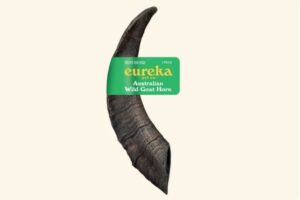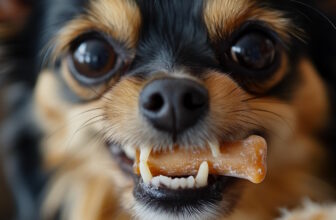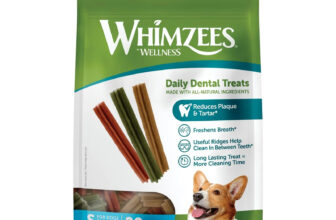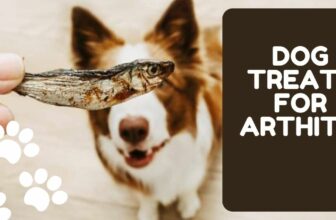Goat Horns for Dogs

Goat horns are becoming a popular natural treat for our dogs, but why?
Lot’s of reasons in fact. So let’s take a look…
Related: Recommended treats for dogs
The benefits of goat horns for dogs
If you read my reviews you’ll realise how often I mention the importance of the dental health of our pets.
We don’t want our dogs to be effected by plaque, tartar, or the ensuing tooth rot and dental disease. It’s bad news for the health of our dogs in general, and something most styles of dog food don’t address (even if they claim they do).
One of the key benefits of goat horns for dogs (or bully sticks and deer antlers for that matter), is allowing your dog to naturally keep their teeth clean with their natural instinct to gnaw and chew.
This isn’t the only benefit however, so let’s take a look at all the benefits goat horns can offer your dog:
- Natural and unprocessed – Goat horns are perfect for your dog as they come, which means there’s no need for any additives or preservatives.
- Long lasting – You may wonder why goat horns cost so much, but when you consider how incredibly durable they are you realise they’re worth the money. A goat horn can keep your dog occupied for hours, and you don’t want your dog bored, do you!
- Rich in nutrients – What better treat for your dog than one from an animal source, rich in nutrients which will genuinely benefit your dog? Goat horns are a natural source of essential minerals like calcium and phosphorous to support your dog’s bone health. The trace minerals provided by goat horns will also help boost your dog’s overall well-being as well.
- No allergens – If you have a dog who reacts to certain foods, then goat horns are worry free. They’re a hypoallergenic food (if you can call them food), which means they shouldn’t cause your dog any issues with allergies or dietary sensitivities.
- Low in calories – I use this term loosely as generally I view carbohydrates and sugars in most dog treats more an issue, but goat horns are both low in calories AND free of completely unnecessary carbohydrates and sugars. Take a look at the ingredients of some of the dog treats in the supermarkets and you’ll see exactly what I mean.
- No splintering – You may find your dog chews on sticks, or worse gets hold of cooked bones, and both can splinter and cause your dog serious harm. Goat horns don’t splinter, so are a far safer option for your dog.
- Suitable for all sizes of dog AND puppies – Goat horns can come in a variety of sizes, but generally can be considered one size fits all. They’re great for small, medium, and large dogs alike, and your puppy should be fine too – monitor your dog if you have any concerns.
- Odour-free – This is not something I generally care about (I feed my dog tripe after all), but I know some people aren’t keen on smelly treats. Thankfully goat horns are almost odourless, so won’t upset you or your dinner guests.
- Mental stimulation – This is so often overlooked when it comes to feeding our dogs in general, but there are real benefits from offering them mental stimulation. There is no better way to mentally stimulate your dog than to bring out their natural instincts. Goat horns do just that, and the simple fact you’re keeping them occupied means you’re also stimulating them mentally. Science has shown this can lead to a better behaved, more loyal, more intelligent dog (combined with other mental stimulation of course!)
Where can I buy goat horns for dogs?
A brand I highly recommend is Eureka, and you can see why if you read the Eureka dog food review. Their Australian Wild Goat Horn treat, available here, would be a very good, very safe bet:

The Bugsy Shop is another great place to buy quality goat horns (and beef pizzle as well). Take a look here.
Other brands of goat horn dog treat might be imported from overseas, sometimes using irradiation (not good for your dog). Buy Australian, or New Zealand, if you can:
Are goat horns suitable for puppies?
Goat horns are generally safe for puppies, but there are a few important points to consider. I’m sure you know your dog and their eating habits already, but consider the following:
- Supervision is key! – Always supervise your puppy when they are chewing on a goat horn (or any type of dog chew for that matter). Puppies are more likely to chew aggressively, and there is a risk they could break off or swallow larger pieces. This may pose a choking hazard or lead to digestive issues, so be careful until you know your puppy can chew a goat horn responsibly.
- Monitor wear and tear – Regularly inspect the goat horn for signs of wear and tear. If it becomes small enough for your puppy to swallow or if it starts to splinter, it’s time to replace it with a new one.
- Feed from 3+ months – Some may offer their puppies a goat horn from a younger age, and generally this will be fine, but err on the side of caution and start feeding from a minimum of three months old. By this stage your puppy will have stronger teeth with some adult teeth coming through. Very young puppies may not have the jaw strength or dental development needed to safely chew on harder materials.
- Introduce gradually – Some puppies may not immediately take to goat horns. Some may need time to adjust to the new chew. This can particularly be the case if they’ve been fed one brand of kibble until this point (never a good idea). Introduce the goat horn gradually and observe your puppy’s reaction to ensure they are comfortable with it.
- Always ask your veterinarian for advice – When you have a puppy you will visit your veterinarian for vaccines, early check-ups, or puppy school (recommended to get your pup used to the vets!). Take this opportunity to ask their advice. Our vets are always a good source of information and help us learn and becoming better pet parents, even if they tend to recommend grain-based kibbles for pet carnivores.
Final thoughts on goat horns for dogs
Are goat horns something you feed your dogs? What advice can you give other dog owners – what brands are good, what aren’t, and how often do you feed goat horns to your dogs?
Feel free to add your thoughts in the comments section below!







Do goat horns go off? If so how long do they last?
Hi Carole, as a natural product I expect they would eventually. I usually throw them away if they start to crack or splinter, or if edges get a bit sharp, but I can’t say I’ve had one long enough to start smelling (not that my dog would mind).
Our vet recently commented on the difference between ‘chewing on’ and ‘chewing through’ something for good dental hygiene. They said that ‘chewing through’ is where the deep cleaning up and around the gum line happens, and this typically happens with things like large kibble, dental sticks e.g. Greenies, and their daily kibble if they don’t wolf it down.
Do you have any comments on this? To me horns and antlers seem like things a dog would be ‘chewing on’. Are there still dental benefits from this?
P.S. thanks for all that you do! I find the reviews really helpful
Hi TJ, generally the “science” in this respect is very hazy, and most of these beliefs come from pet food companies. Usually these claims are worded “may help clean teeth” or “can fight plaque and tartar” which doesn’t necessarily mean they do, or not to any meaningful effect.
From personal experience I’ve seen the teeth of numerous dogs and cats have an incredible turnaround when raw meaty bones or tough meat/animal based chews are introduced. I can’t say I’ve seen the same for dogs fed wet mush, kibble, or Greenies. I wouldn’t consider the ingredients of brands like Greenies overly species appropriate either, but there aren’t really any regulations for any dog treats to be healthy anyway.
If I observe my own dog “chewing on” a bone or chew, there is definitely dental descaling going on! She also has a tendency to use one side of her mouth, and the teeth on that side are always completely clear of any plaque and tartar.
My 13 year old cat has always “chewed on” (I’m going to steal that chewed on/chewed through term!) raw meaty bones such as chicken necks/wings and the occasional dried meat chew, and he has no plaque or tartar whatsoever – not bad for an “elderly” cat.